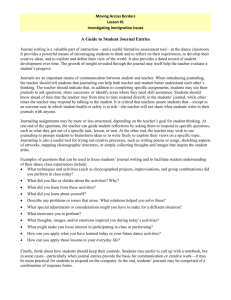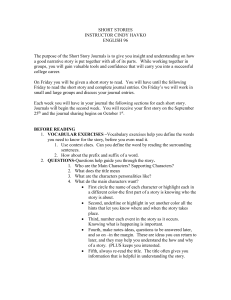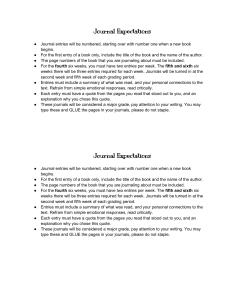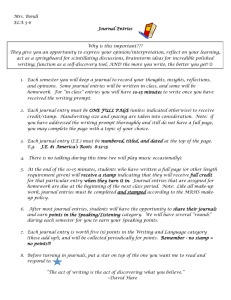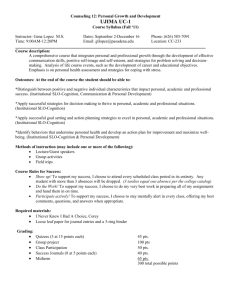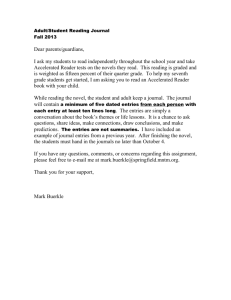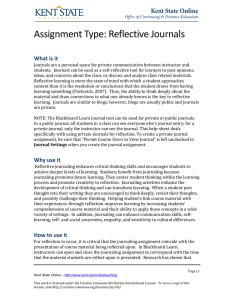Writing Journal The word journal comes from a French word
advertisement
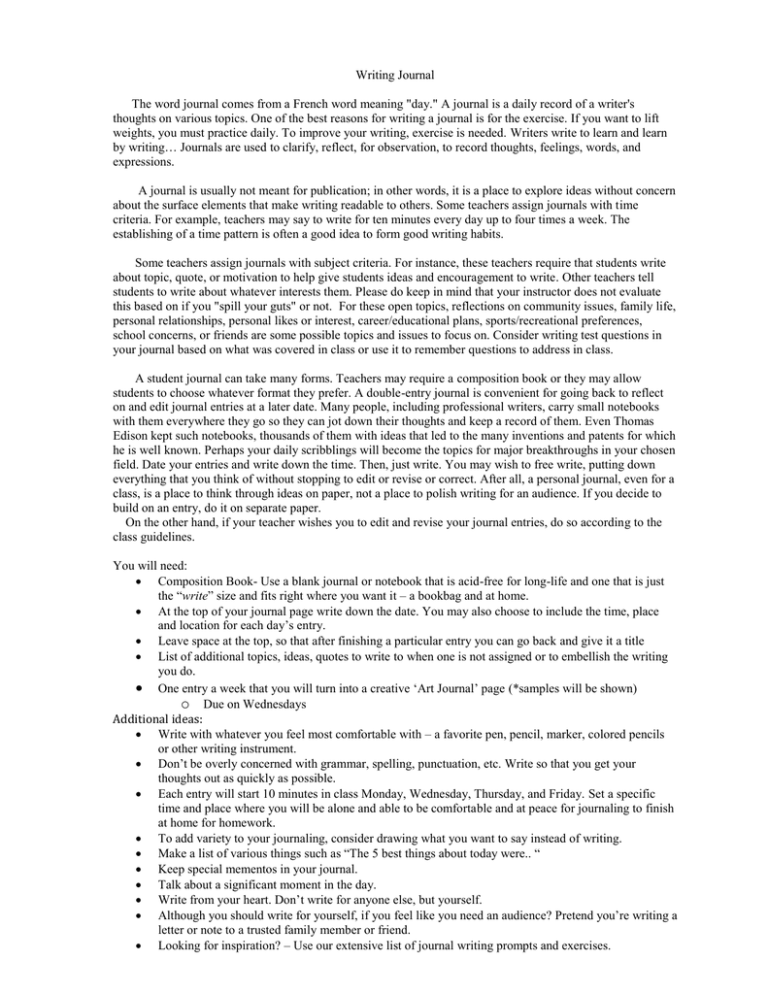
Writing Journal The word journal comes from a French word meaning "day." A journal is a daily record of a writer's thoughts on various topics. One of the best reasons for writing a journal is for the exercise. If you want to lift weights, you must practice daily. To improve your writing, exercise is needed. Writers write to learn and learn by writing… Journals are used to clarify, reflect, for observation, to record thoughts, feelings, words, and expressions. A journal is usually not meant for publication; in other words, it is a place to explore ideas without concern about the surface elements that make writing readable to others. Some teachers assign journals with time criteria. For example, teachers may say to write for ten minutes every day up to four times a week. The establishing of a time pattern is often a good idea to form good writing habits. Some teachers assign journals with subject criteria. For instance, these teachers require that students write about topic, quote, or motivation to help give students ideas and encouragement to write. Other teachers tell students to write about whatever interests them. Please do keep in mind that your instructor does not evaluate this based on if you "spill your guts" or not. For these open topics, reflections on community issues, family life, personal relationships, personal likes or interest, career/educational plans, sports/recreational preferences, school concerns, or friends are some possible topics and issues to focus on. Consider writing test questions in your journal based on what was covered in class or use it to remember questions to address in class. A student journal can take many forms. Teachers may require a composition book or they may allow students to choose whatever format they prefer. A double-entry journal is convenient for going back to reflect on and edit journal entries at a later date. Many people, including professional writers, carry small notebooks with them everywhere they go so they can jot down their thoughts and keep a record of them. Even Thomas Edison kept such notebooks, thousands of them with ideas that led to the many inventions and patents for which he is well known. Perhaps your daily scribblings will become the topics for major breakthroughs in your chosen field. Date your entries and write down the time. Then, just write. You may wish to free write, putting down everything that you think of without stopping to edit or revise or correct. After all, a personal journal, even for a class, is a place to think through ideas on paper, not a place to polish writing for an audience. If you decide to build on an entry, do it on separate paper. On the other hand, if your teacher wishes you to edit and revise your journal entries, do so according to the class guidelines. You will need: Composition Book- Use a blank journal or notebook that is acid-free for long-life and one that is just the “write” size and fits right where you want it – a bookbag and at home. At the top of your journal page write down the date. You may also choose to include the time, place and location for each day’s entry. Leave space at the top, so that after finishing a particular entry you can go back and give it a title List of additional topics, ideas, quotes to write to when one is not assigned or to embellish the writing you do. One entry a week that you will turn into a creative ‘Art Journal’ page (*samples will be shown) o Due on Wednesdays Additional ideas: Write with whatever you feel most comfortable with – a favorite pen, pencil, marker, colored pencils or other writing instrument. Don’t be overly concerned with grammar, spelling, punctuation, etc. Write so that you get your thoughts out as quickly as possible. Each entry will start 10 minutes in class Monday, Wednesday, Thursday, and Friday. Set a specific time and place where you will be alone and able to be comfortable and at peace for journaling to finish at home for homework. To add variety to your journaling, consider drawing what you want to say instead of writing. Make a list of various things such as “The 5 best things about today were.. “ Keep special mementos in your journal. Talk about a significant moment in the day. Write from your heart. Don’t write for anyone else, but yourself. Although you should write for yourself, if you feel like you need an audience? Pretend you’re writing a letter or note to a trusted family member or friend. Looking for inspiration? – Use our extensive list of journal writing prompts and exercises. Poetry, quotes, lyrics…
